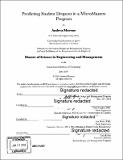Predicting student dropout in a MicroMasters program
Author(s)
Moreno, Andrea(Andrea Carolina Moreno Tomalá)
Download1119537471-MIT.pdf (9.509Mb)
Other Contributors
Massachusetts Institute of Technology. Engineering and Management Program.
System Design and Management Program.
Advisor
Chris Caplice and Eva Ponce.
Terms of use
Metadata
Show full item recordAbstract
Massive Open Online Courses (MOOC) became popular in 2012. Today, MOOCs have evolved from single courses to programs that consist of a series of courses, and one or more proctored exams. Once completed, these programs open doors to career advancement and even master's degrees from renowned universities across the globe. Despite the increasing popularity and benefits of such programs, the dropout rate is surprisingly high. The purpose of this thesis is to build accurate predictive models of student dropout in MOOC-based programs as well as identify which factors are correlated with dropout. For this study, we focused in a MOOC-based program known as a MicroMasters. We chose the first ever created MicroMasters: the MITx MicroMasters® in Supply Chain Management. We collected data from more than 10,000 students, 25 courses and used Logistic Regression to build our predictive models. Results show that there are different factors associated with dropout depending on where in the program ladder the student is at. For students in initial courses, grades, gender, and level of education are correlated with dropout. Our models reached recall values as high as 0.98 and precision values as high as 0.93. For learners who have completed four or more courses, our models are not highly predictive, suggesting that external factors outside of the scope of this study, such as personal reasons or day-to-day duties, prevented learners from finishing the program. Finally, several high-level strategies were developed in order to guide a plan to reduce learner dropout at any point in the MicroMasters. The results found in our research, in conjunction with a solid implementation plan, is the first step to decrease program attrition.
Description
Thesis: S.M. in Engineering and Management, Massachusetts Institute of Technology, System Design and Management Program, 2019 Cataloged from PDF version of thesis. Includes bibliographical references (pages 65-68).
Date issued
2019Department
Massachusetts Institute of Technology. Engineering and Management ProgramPublisher
Massachusetts Institute of Technology
Keywords
Engineering and Management Program., System Design and Management Program.